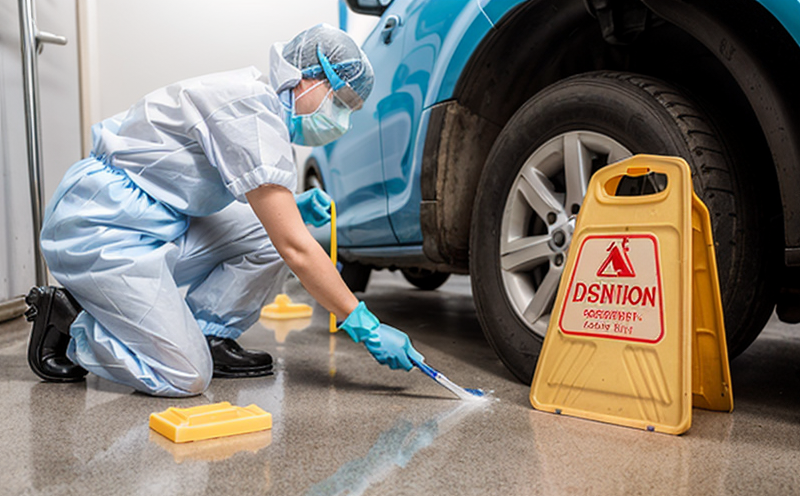Disinfectant usage inspection
The inspection of disinfectant usage is a critical component in ensuring food safety and hygiene. Disinfectants play an essential role in reducing microbial contamination, which can prevent outbreaks of foodborne illnesses such as Salmonella, Listeria, and E. coli. This service focuses on the rigorous testing and evaluation of disinfectants used within the food industry to ensure they meet stringent standards for efficacy and safety.
The process begins with thorough sampling of the disinfectant being used in various stages of production or storage. The sample is then subjected to a series of tests that simulate real-world conditions, ensuring its effectiveness against common pathogens relevant to the sector. These tests are conducted according to international standards such as ISO 18173-1:2016 and ASTM E2545.
Upon receiving the sample, our laboratory technicians perform a series of microbiological evaluations, including:
- Microbial killing efficiency against specified bacteria and viruses
- Residual activity testing to ensure safety after contact time
- Toxicity assessment using appropriate cell cultures or animal models
- Compatibility checks with packaging materials and surfaces used in the food industry
The results of these tests are meticulously analyzed and compiled into a detailed report. Compliance with relevant standards is paramount, and our team ensures that all findings are presented accurately to help clients make informed decisions.
In addition to standard testing protocols, we offer customized inspection services tailored to specific client needs. This could include additional tests for particular pathogens or extended compatibility assessments based on unique production environments.
The importance of proper disinfectant usage cannot be overstated in maintaining high standards of food safety and hygiene. By adhering to strict testing procedures and international guidelines, we provide peace of mind knowing that the products used are safe and effective in their intended applications.
Why It Matters
The proper use of disinfectants is crucial for maintaining food safety standards and preventing contamination. Contamination from pathogens can lead to serious health issues, including gastrointestinal illnesses, which may result in hospitalization or even death if not addressed promptly.
In the context of the food sector, ensuring that disinfectants are effective against various bacteria, viruses, and fungi is vital for protecting consumer health. The FDA (Food and Drug Administration) and other regulatory bodies emphasize the need for rigorous testing to verify the safety and efficacy of these products before they enter the market.
For quality managers and compliance officers responsible for overseeing disinfectant usage within food production facilities, this service provides assurance that all measures are being taken to minimize risks associated with microbial contamination. It also helps in meeting regulatory requirements set by organizations like the FDA, USDA (United States Department of Agriculture), and local health departments.
R&D engineers benefit from this inspection as it allows them to refine formulations and improve product performance. By understanding how different factors affect disinfectant efficacy, they can develop more efficient and reliable products that meet or exceed industry expectations.
Procurement teams find value in knowing that the suppliers they choose are committed to producing safe and effective disinfectants through rigorous testing processes. This information supports better decision-making when selecting vendors who align with corporate sustainability goals related to food safety.
Customer Impact and Satisfaction
Implementing robust disinfectant usage inspection services has a direct positive impact on customer satisfaction by enhancing overall food safety standards within the industry. When consumers know that the products they purchase come from manufacturers who adhere strictly to best practices in hygiene and sanitation, trust is built.
This trust translates into increased loyalty among customers who prioritize their health and wellbeing when purchasing food items. Furthermore, satisfied customers are more likely to recommend trusted brands to friends and family members, fostering growth for businesses that invest in quality assurance initiatives like those provided by our laboratory.
From an operational standpoint, having reliable data on disinfectant performance allows companies to identify areas where improvements can be made. For instance, if a particular product fails certain tests during inspection, corrective actions can be taken immediately to address issues before they escalate into larger problems down the line.
The transparency offered by our comprehensive reports ensures that all stakeholders involved in food production are aware of any shortcomings and have clear guidance on how best to rectify them. This proactive approach not only protects against potential legal challenges but also demonstrates a commitment to continuous improvement which resonates well with modern consumers who expect more from the brands they support.
Environmental and Sustainability Contributions
The responsible use of disinfectants contributes significantly towards environmental protection efforts within the food industry. By ensuring that only effective yet environmentally friendly solutions are employed, unnecessary waste generation can be minimized while still maintaining high standards of hygiene.
Our laboratory services play a key role in promoting sustainable practices by identifying eco-friendly alternatives that offer comparable or superior performance to conventional disinfectants without compromising on efficacy. Through research and development initiatives focused on green chemistry principles, we contribute to reducing the carbon footprint associated with chemical manufacturing processes.
The selection of less toxic ingredients for formulation purposes reduces exposure risks not only for workers handling these products but also for consumers who might be indirectly affected by residue levels present in final goods. This aligns perfectly with broader corporate sustainability strategies aimed at creating a healthier planet for future generations.
Moreover, our commitment to continuous improvement ensures that we stay ahead of evolving regulatory trends related to environmental impact assessments (EIA). By incorporating feedback from both internal and external sources into our testing methodologies, we help clients navigate complex landscapes surrounding sustainable business practices more effectively than ever before.





